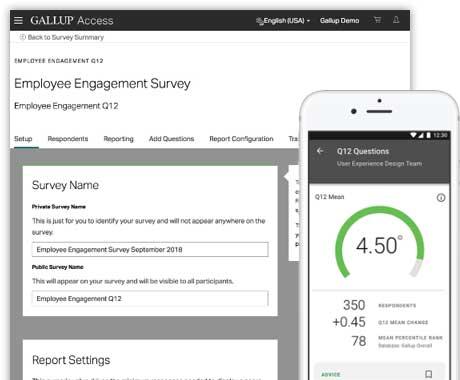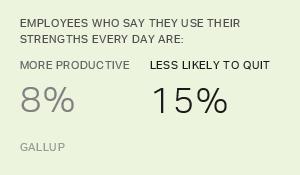It's likely that you can easily recite your team members' roles and responsibilities -- what they do.
But do you clearly understand, and can you explain, why they perform well in their roles?
The most effective managers Gallup has studied share the ability -- regardless of industry or organization type -- to understand and describe in detail each team member's unique talents -- the why.
These managers adopt a strengths-based approach to leading their employees. They use the CliftonStrengths assessment to better understand what motivates their people; how each person naturally thinks, feels and behaves; and how they build relationships within their own team and across other teams.
Essentially, the best managers shape and constantly review employees' roles to ensure that they're using their strengths every day.
This approach is great for business.
Gallup analytics prove teams and organizations that take a strengths-based approach to development and culture outperform those that don't in key performance outcomes such as profit, customer and employee engagement, and turnover.
The positive effect these efforts have on overarching performance metrics is the result of an approach that gives employees the opportunity to feel empowered, energized and engaged in their work.
Managers Must Tune Into Talent to Energize and Empower Employees to Perform Their Best
Gallup's written at length about this in the past: Employees want a lot from their managers. But when you consider the effect of the manager on employees' opportunity to do what they do best every day, that want is really a need.
To succeed in their role and help their team and organization perform better, employees need to know what they naturally do best. They need to know how to use their talents to accomplish whatever it is their role demands of them.
But first, the manager must support employees in discovering their talents and developing them into CliftonStrengths that they can use to succeed in their career. And, in instances when employees do not feel energized and empowered to be successful in their role, they need their manager to help them find ways to use their strengths at work.
When talking about the power of strengths-based development, Don Clifton once said, "If you like what you're doing it feels good to you and it regenerates your own energy."
What does that energy look like in an employee?
Clifton observed the effect of that energy in his pioneering studies in the field of positive psychology. He understood that when individuals use their natural talents in their job -- when they feel empowered to use their best to be their best -- they bring a positive presence to their work and are inspired to make a positive impact on their organization.
When individuals use their CliftonStrengths, they approach their work differently:
- They come to work each day energized and ready to tackle their responsibilities.
- They enjoy their job so much that they can't help but spend time thinking about their work outside of traditional office hours.
- They aspire to produce excellent results in all that they do.
- They stay focused on goals, overcome obstacles and perform with excellence -- often without needing much guidance from their manager.
These outcomes don't go unnoticed. Rather, teammates and others feed off of the energy that comes from someone positioned to do what they do best every day.
The natural confidence and perspective these people bring to their role helps them accomplish higher quality work at a quicker pace. These employees consistently achieve desired outcomes and become known for their commitment to excellence.
These people sound like the type of employees who could be invaluable to your team and your organization's success.
But how can you develop more employees like these energetic, empowered and engaged ones?
Five Clues to Understanding Your Employees' Talents
Organizations must empower employees and their managers to use their CliftonStrengths results. From there, managers must embrace Clifton's framework of asking questions that aid in a better understanding of how employees' talents fit particular roles and opportunities to succeed.
The framework, specifically known as the "five clues to talent," enables managers to better shape roles and responsibilities to fit individuals' best chances to succeed. Managers need to consider these clues -- employees' natural yearnings, satisfaction, rapid learning, glimpses of excellence and total performance excellence -- when positioning people to do their best work and have a positive effect on team and organizational performance.
Managers can develop a better understanding of employee talent by asking individuals the following questions and spending time exploring the answers during meaningful conversations.
- What do you know you can do well but haven't done yet?
- What sorts of activities do you finish and think, "I can't wait to do that again"? Or what are you doing -- inside or outside work -- when you're truly enjoying yourself?
- What have you done well that you didn't need someone to explain how to do?
- What have other people told you you're great at doing?
- What activities are you doing when you are unaware of time passing?
Employees' answers to these questions and the resulting conversations should be the foundation of any exceptional manager's efforts to energize and empower people to perform better by doing what they naturally do best every day.
Gallup can help you empower, energize and engage your employees to succeed:
- Discover how to use the CliftonStrengths assessment to coach your teams to great outcomes.
- Watch our on-demand webinar and download a course overview to learn how our Leading High-Performance Teams course helps managers get the most out of employees' talents.
- Download our strengths meta-analysis research paper to read about the powerful connections between strengths-based development and business performance.


